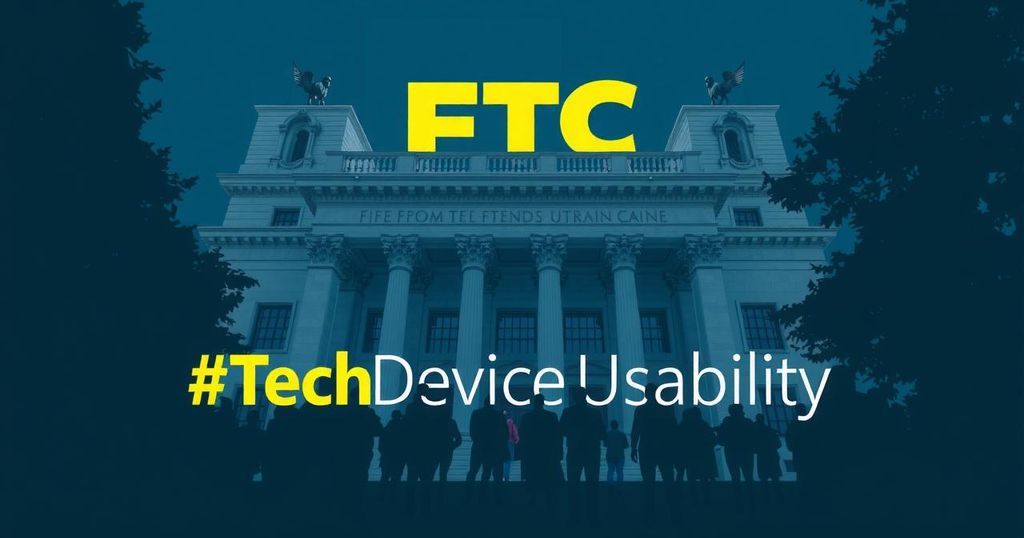Consumer groups, including Consumer Reports and US PIRG, are urging the FTC to regulate ‘software tethering,’ a practice where product functionality is dependent on external software updates, leading to early obsolescence. They argue for clear guidelines to ensure consumer trust in product lifespan, especially as the tech industry increasingly pushes towards connected devices. The coalition cites various devices rendered unusable due to discontinued support and calls for mandatory minimum support periods and the preservation of product functionality post-support.
A coalition comprising various consumer advocacy and anti-waste organizations is urging the Federal Trade Commission (FTC) to regulate a practice known as “software tethering.” This practice links a product’s functionality to external software updates, often leading to devices becoming inoperative when manufacturers cease to provide updates. Notable groups involved in this initiative include Consumer Reports, iFixIt, US PIRG, the Electronic Frontier Foundation, the Centre for Economic Justice, and Californians Against Waste. They have submitted a letter requesting that the FTC formulate clear guidelines regarding software tethering, emphasizing that such regulations would empower consumers to trust that their connected devices will remain functional for the expected duration of their lifespan. The coalition’s letter outlines multiple instances where products have lost significant functionality due to software tethering. A prominent example cited is the Snoo bassinet, priced at $1,695, where consumers discovered that certain features were later restricted behind a subscription fee. The letter also references the Juicero juicer, which became obsolete following the company’s closure, leaving users unable to utilize their devices. Representatives from these groups argue that manufacturers are capitalizing on software to manipulate consumers into replacing products that would otherwise remain functional. Lucas Rockett Gutterman, the US PIRG’s Director of Designed to Last, remarked, “Manufacturers are increasingly using software to force us into using their products in ways that boost their profits. If we want to stop the tech industry from pushing us to replace still-functioning products, we must defend consumers’ right to use what they’ve paid for, especially in this age of connected devices.” The coalition highlights that even major corporations such as Google have halted support for specific products, compounding the issue for consumers. They express particular concern regarding the obsolescence of smart home devices and larger appliances, pointing out that the failure of such products not only represents a significant financial loss for consumers but also contributes to excessive waste generation. According to a study by Consumer Reports included in the letter, of the 22 major smart appliance manufacturers surveyed, only three had provided a definitive timeline on the duration for which they would offer cybersecurity and software updates, while four others offered vague assurances without clear timeframes. Looking forward, the coalition anticipates that the problem will escalate as more manufacturers introduce connected products that require app-based functionality or internet connectivity. To mitigate these issues, they propose several recommendations for FTC action, including mandating companies to specify a minimum support period for their products, ensuring core functionalities remain accessible despite software update cessation, encouraging mechanisms to facilitate product reuse post-support, safeguarding the concept of adversarial interoperability, and educating manufacturers on developing durable products. The letter concludes with a poignant warning: “Consumers are already feeling the negative effects of software obsolescence, and without clear guidance and enforcement, companies will continue to take risks with connected devices that they have no intention of supporting in the long term.”
The growing concern surrounding software tethering stems from the increasing reliance on internet connectivity and software updates for the functionality of consumer products. This trend has led to a situation where many devices essentially become obsolete once manufacturers discontinue support for them. Consumer advocacy groups argue that this practice not only frustrates consumers but also contributes to environmental waste by forcing replacements for devices that could still be operational. As more companies release smart devices that depend on ongoing software support, the call for regulatory oversight intensifies to ensure consumers’ rights are protected and that products endure for their intended lifespan.
The coalition’s initiative underscores the urgent need for the FTC to address the pressing issue of software tethering in consumer electronics. By establishing clear guidelines, the Commission could foster an environment where consumers can confidently rely on their products over time, rather than facing abrupt obsolescence. As highlighted by the letter, proactive measures are necessary to safeguard consumers against manipulative practices that jeopardize their investments and contribute to environmental waste. Without regulatory intervention, the trend of software obsolescence is likely to persist, leaving consumers at a disadvantage in an increasingly digital marketplace.
Original Source: www.techedt.com

Leave a Reply